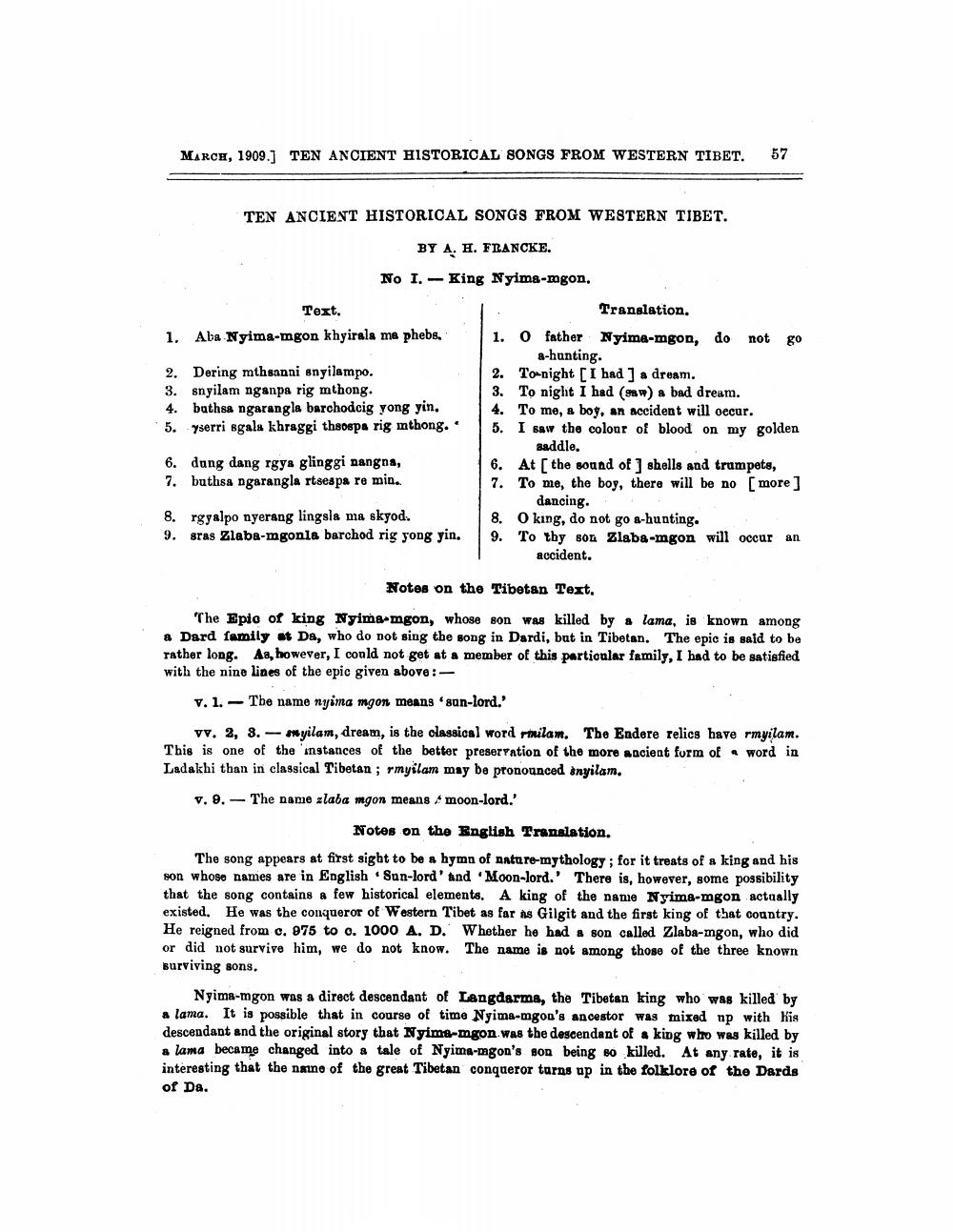________________
MARCH, 1909.) TEN ANCIENT HISTORICAL SONGS FROM WESTERN TIBET.
57
TEN ANCIENT HISTORICAL SONGS FROM WESTERN TIBET.
BY A. H. FRANCKE.
No I. - King Nyima-mgon.
Text. 1. Aba Nyima-mgon khyirala ma phebs.
2. Dering mthsanni enyilampo. 3. snyilam nganpa rig mthong. 4. bathsa ngarangla barchodcig yong yin, 5. Yerri sgala khraggi thaospa rig mthong.
Translation, 1. O father Nyima-mgon, do not go
a-hunting. 2. To-night [I had ] a dream. 3. To night I had (98) a bad dream. 4. To me, & boy, an accident will occur. 5. I saw the colour of blood on my golden
saddle. 6. At the sound of shells and trumpets, 7. To me, the boy, there will be no [more]
dancing. 18. O king, do not go a-hunting. 9. To thy son Zlaba-mgon will occur an
accident.
6. dung dang rgya glinggi nangna, 7. buthsa ngarangla rtsespa re min.
8. rgyalpo nyerang lingsla ma skyod. 9. sras Zlaba-mgonla barchod rig yong yin.
Notes on the Tibetan Text.
The Epio of king Nyime-mgon, whose son was killed by a lama, is known among a Dard family at Da, who do not sing the song in Dardi, but in Tibetan. The epic is said to be rather long. As, however, I could not get at a member of this particular family, I had to be satisfied with the nine lines of the epic given above :
v. l. The name nyima mgon means "sun-lord.'
vv. 2. 3. - myilam, dream, is the classical word milam. The Endere relics have rmyilam. This is one of the instances of the better preservation of the more ancient form of a word in Ladakhi than in classical Tibetan ; rmyilam may be pronounced anyilam.
v. 9. - The name alaba mgon means Amoon-lord.'
Notes on the English Translation.
The song appears at first sight to be a hymn of nature-mythology; for it treats of a king and his son whose names are in English Sun-lord' and Moon-lord.' There is, however, some possibility that the song contains a few historical elements. A king of the name Nyima-mgon actually existed. He was the conqueror of Western Tibet as far as Gilgit and the first king of that country. He reigned from o, 075 to o. 1000 A. D. Whether he had a son called Zlaba-mgon, who did or did not survive him, we do not know. The name is not among those of the three known surviving sons.
Nyima-mgon was a direct descendant of Langdarma, the Tibetan king who was killed by a lama. It is possible that in course of time Nyima-mgon's ancestor was mixed np with his descendant and the original story that Nyims-mgon was the descendant of a king who was killed by a lama became changed into a tale of Nyima-ngon's son being 80 killed. At any rate, it is interesting that the none of the great Tibetan conqueror turns up in the folklore of the Dards of Da.




